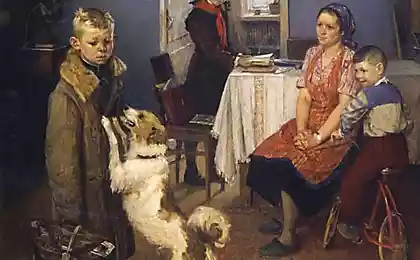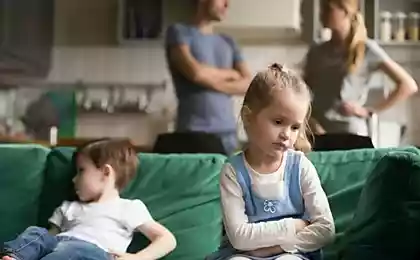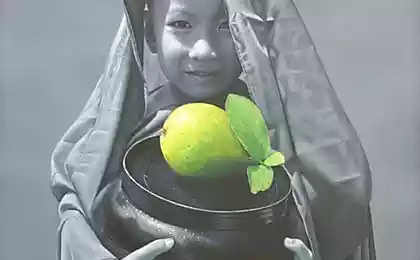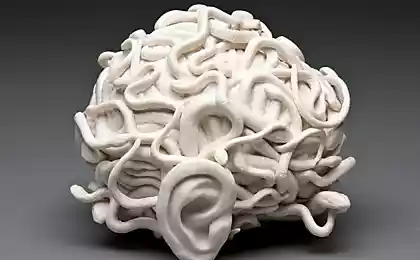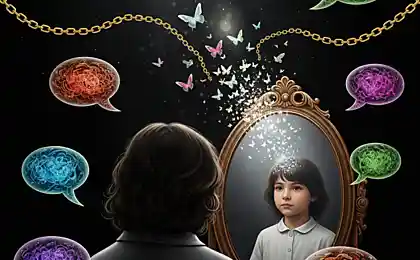603
Top 10 mistakes parents from family psychologist Katherine Murashova
Family psychologist and columnist edition of "snob" Katerina Murashova spoke about the most common mistakes that parents. Of course, it makes them not from stupidity, but from zeal and anxiety, something goes wrong. No need to worry, encourages Katerina. Everything will be fine. When a child comes into the world, all in the first place parents want him to be happy and raised a good man. What happens then? At some point we have failures begin to occur, leading to the opposite effect! < Website lists the top ten misconceptions associated with raising a child.

1. I will live for their children, "I have something to live for. I will live for their children. Their education - my main task »

. No one can be the target for anyone - it's too big a responsibility that falls on the shoulders of the newborn. If I live for you, you owe me something to answer, meet my expectations. There comes a time when the child can not do, because what begins to feel guilty. He understands the sacrifices parents have gone for him.
Two hundred years ago, a woman that entered the reproductive cycle, had five or six children, a small cemetery of dead babies and lived to bring up the survivors. Children perceive it quite calmly, because her sacrifice was divided at all. Now often one child falls not only the mother, who lives for his sake, and even grandparents on both sides, who for a long time waiting for him. For the child, it's hard psychologically, in this regard, there can be problems. In any given period of time humanity has managed to win child deaths and virtually all infections that decimated entire towns. It saves only one thing - a neuro-psychiatric diseases, and they are always younger: youth depression, Alzheimer's disease, autism spectrum disorders, and others. Total one error associated with the installation of "I have something to live for," is enough to ensure the development of the child neurotic.
2. The game of democracy "child - equal to my personality. . Liberty, equality and fraternity »
you seen a duck with ducklings as they walk: first the mother and her young. Were there ever ducklings, who went in the other direction? Of course there were, but they were eliminated by natural selection. They ate. In the process of evolution by means of natural selection were chosen young, able to follow the female, or two parents, if type training is carried out jointly. And the child enters the world, where he is told: "You are equal to me as a person." In such a world, he is forced to dispose of older people, and it is too much for him. As a result, we again have neuroticism.
Often "game of democracy" leaves the roots in childhood parents. Most of them had a difficult relationship in the family, so now they want to be "friends" with their children. As a rule, it prihippovannaya single mother with a son, who agree on everything, as long as it does not touch him, and she is trying to be "good mother" and other. This is the only version of democratic education. In a large family, this situation is impossible, because there is always someone will stand out. When you are behaving like a "big duck" build for the child world, with its dangers and "beautiful" - this is the respect and proper behavior towards him. Because he came into the world under your wing, and it will take some time before he would say that has grown and it's time to get himself
3 "adult duck.". There is only true model of education "There are many different options for education and, probably, somewhere there is a right that you need to find and use them».
Populations need children who are able to carefully follow the instructions, but the need and those who is able to break them. The only criterion for which is based in the education - is you. What if in education intervenes older generation? For example, you forbid her daughter to play with her makeup, but she goes to her mother in law, and she gives her own. How, then, to set boundaries?
We must understand that grandparents - no matter what they say - absolutely right because the wrong model just does not happen. Moreover, one of these models has brought you. We must not be afraid to tell them: "Thank you, dear, for your opinion, but this is my family and my child, and it will do so, as is customary in our country. But thank you, because you're right. " It will limit: cosmetics-law can take, my - you can not. No template gap in the minds of children not going to happen.
My eldest daughter was absolutely independent child is five years old. On the weekend, I took her to her grandmother and great-grandmother. The great-grandmother, who raised me, after suffering a stroke ceased to know me. But my daughter, she learned well, and, moreover, when I led her, she seemed to be included, and quite differently behaved. It looked like this: open the door, my self daughter enters the corridor lies on his back, lifts up his feet and said: "You, Gal (this is my mother), take off my boots, and you, Bull (short Grandma.) Carry cinnamon rolls". I'm beginning to shyly hints that maybe, if you do not wash your hands, then at least the first strip, and then rolls. At my grandmother shuffling slippers, carrying a tray of buns in their hands to me: "Let the baby first bun eat in the hallway, what's wrong?" And throws to the bun. What could I argue brought me a woman who does not know me already? I had only to walk out the door and disappear.
Two days later I got my baby, and as soon as she stepped over the threshold by clicking the border include those in which she was living at home. Children are able to distinguish between the boundaries, as long as they are clearly defined. Our task - to inform the child, in what world he was, and form their model of education
4.. The child itself to cope with their studies, "With me lessons did, but I learned. I grew up a normal person, means some guarantee there »
This position is logically consistent, except for one:. You - not your parents, your child - not you, and the world in which you educate your child, - not the one in which you were brought up. The child may be different in temperament, nervous system strength and other parameters, it is not necessary to talk about the differences in the environment. Therefore, to use foreign models, and even more so to let things take their course - not the best solution to the problem. There is a chance that a child will cope with everything myself and be able to achieve a lot, but to increase this chance to help your child.
5. Knut and pryanikMetod "carrot and stick": positive and negative reinforcement
. There are two types of people who do not steal. Some are afraid that they will be put in jail, others feel that they get dirty in it. "Carrot and stick" can raise a child only the first type. The second type - a sense of inherent significant others since childhood. There is no internal moral law, is that once we have laid in, although we do not remember. With negative reinforcement can only stop undesirable behavior. To cultivate good habits, you need to remember about positive reinforcement. When your child does something good - especially if used in a situation like he did on the contrary, - tell him about how good it is. The child wants to be good, and, noticing the points raised praise, will try to repeat them.
In this project the feelings of those to yourself, it makes no sense to say that a child receives good or bad in relation to another person, the only person whose emotions and feelings of his concern - is you. Take responsibility.
6. Children are not little animals "methods that apply to animals can not be applied to children: it is immoral».
This is a mistake. When children are born, they are at 80% - the small little animals. Humanization begins almost immediately, but gradually. While the child is small, it is very much the animal. And the things that apply to education kittens, puppies and other animals, too, are applicable to him. Think of the conditioned reflex, calls a method of positive and negative reinforcement.
7. Negotiations with the child "With a child can always negotiate».
Psychologist Lorenz Kohlberg built the stages of child development on the basis of his moral development. Services offered conditions of the problem: there is one boy who banned climbing to the buffet for a jam. One day, no one has yet seen, he decided to get jams and accidentally dropped the cup; she fell and broke. And there's another boy, whose parents were asked to carry out of the kitchen into the dining room with a tray of cups. When he carried a tray, then accidentally tripped and broke all the cups. Then the question was raised as a boy, in their opinion, is more to blame. Children under the age of five years were told that a second, because he has broken more cups.
When you make an agreement with a small child, you need to understand what you are trying to negotiate with a structure significantly different from you in the intellectual, psycho-physiological, moral and ethical terms. Sometimes you have to say, it would be so, because you are older and more experienced. It is not necessary to explain how the electric current, because the child does not care, he just wants to poke fingers in the socket. To begin it is necessary to negotiate when the child will form ideas about causation and it will begin to ask the question "why", which you will be required to answer. This ripening usually occurs after three years.
8. What's right for me, right and for the child, "If I have something obvious, the child is too sooner or later understand. If I believe that education - a very necessary thing, he also begins to think »
a mistake to believe that if the teacher at school says your child is clever and he just needed a little more to try, or you bring him. examples of other children who come to their senses, or refer to the authoritative people, sooner or later the child will realize that you need to take up their studies. What for you is obviously and correctly, not obvious and it is wrong for him. And how would you explain any child, it is not enough that can change.
9. I'd rather know what he wants, "I'm older and wiser than his child, so I know better what it needs».
Logically this consistently, the child is really much less information, the forces, the ability to form causal relationships . But he - not you. What need you, your child may not be useful, because it is different, it can be very different needs. You can try to tell him about his views, but to show that it's your opinion, "I think", "I think so." Do not say that all is clear that higher education is necessary. It is obvious to all, except those who without him find his place in life and be happy.
10. The child solve my problem "My baby came into this world so that I could solve some of his problems».
It can be lonely, filling the harmony in the family or hope for care in old age. There is the phenomenon of mother-animator. It looks like this: "In the morning, we have 15 minutes of training with the kinetic sand, then by Glenn Doman cards, after which we half an hour doing by Duchenne, then walk, where we feed the ducks at the same time learn the Latin names, followed by lunch and fifteen minutes of role-playing games then we modeling ... "This mother was not able to realize some personal needs and projects are now on their child interacting in fact with him.
The problem is that after a while she suddenly discovers that behind all this there is a living person, with his worldview and interests. And when he starts do not reach a certain level, or refuses to do what he does not like, such a mother falls into a depression, because it is all planned out. From this situation there is no positive way out. Sooner or later this will affect the parents and the child. A child comes into the world is not for you to solve your problems. It comes as a new entity, and must solve it and not you. < The world through you create something new, and it's a miracle.
via snob.ru/selected/entry/107429

1. I will live for their children, "I have something to live for. I will live for their children. Their education - my main task »

. No one can be the target for anyone - it's too big a responsibility that falls on the shoulders of the newborn. If I live for you, you owe me something to answer, meet my expectations. There comes a time when the child can not do, because what begins to feel guilty. He understands the sacrifices parents have gone for him.
Two hundred years ago, a woman that entered the reproductive cycle, had five or six children, a small cemetery of dead babies and lived to bring up the survivors. Children perceive it quite calmly, because her sacrifice was divided at all. Now often one child falls not only the mother, who lives for his sake, and even grandparents on both sides, who for a long time waiting for him. For the child, it's hard psychologically, in this regard, there can be problems. In any given period of time humanity has managed to win child deaths and virtually all infections that decimated entire towns. It saves only one thing - a neuro-psychiatric diseases, and they are always younger: youth depression, Alzheimer's disease, autism spectrum disorders, and others. Total one error associated with the installation of "I have something to live for," is enough to ensure the development of the child neurotic.
2. The game of democracy "child - equal to my personality. . Liberty, equality and fraternity »
you seen a duck with ducklings as they walk: first the mother and her young. Were there ever ducklings, who went in the other direction? Of course there were, but they were eliminated by natural selection. They ate. In the process of evolution by means of natural selection were chosen young, able to follow the female, or two parents, if type training is carried out jointly. And the child enters the world, where he is told: "You are equal to me as a person." In such a world, he is forced to dispose of older people, and it is too much for him. As a result, we again have neuroticism.
Often "game of democracy" leaves the roots in childhood parents. Most of them had a difficult relationship in the family, so now they want to be "friends" with their children. As a rule, it prihippovannaya single mother with a son, who agree on everything, as long as it does not touch him, and she is trying to be "good mother" and other. This is the only version of democratic education. In a large family, this situation is impossible, because there is always someone will stand out. When you are behaving like a "big duck" build for the child world, with its dangers and "beautiful" - this is the respect and proper behavior towards him. Because he came into the world under your wing, and it will take some time before he would say that has grown and it's time to get himself
3 "adult duck.". There is only true model of education "There are many different options for education and, probably, somewhere there is a right that you need to find and use them».
Populations need children who are able to carefully follow the instructions, but the need and those who is able to break them. The only criterion for which is based in the education - is you. What if in education intervenes older generation? For example, you forbid her daughter to play with her makeup, but she goes to her mother in law, and she gives her own. How, then, to set boundaries?
We must understand that grandparents - no matter what they say - absolutely right because the wrong model just does not happen. Moreover, one of these models has brought you. We must not be afraid to tell them: "Thank you, dear, for your opinion, but this is my family and my child, and it will do so, as is customary in our country. But thank you, because you're right. " It will limit: cosmetics-law can take, my - you can not. No template gap in the minds of children not going to happen.
My eldest daughter was absolutely independent child is five years old. On the weekend, I took her to her grandmother and great-grandmother. The great-grandmother, who raised me, after suffering a stroke ceased to know me. But my daughter, she learned well, and, moreover, when I led her, she seemed to be included, and quite differently behaved. It looked like this: open the door, my self daughter enters the corridor lies on his back, lifts up his feet and said: "You, Gal (this is my mother), take off my boots, and you, Bull (short Grandma.) Carry cinnamon rolls". I'm beginning to shyly hints that maybe, if you do not wash your hands, then at least the first strip, and then rolls. At my grandmother shuffling slippers, carrying a tray of buns in their hands to me: "Let the baby first bun eat in the hallway, what's wrong?" And throws to the bun. What could I argue brought me a woman who does not know me already? I had only to walk out the door and disappear.
Two days later I got my baby, and as soon as she stepped over the threshold by clicking the border include those in which she was living at home. Children are able to distinguish between the boundaries, as long as they are clearly defined. Our task - to inform the child, in what world he was, and form their model of education
4.. The child itself to cope with their studies, "With me lessons did, but I learned. I grew up a normal person, means some guarantee there »
This position is logically consistent, except for one:. You - not your parents, your child - not you, and the world in which you educate your child, - not the one in which you were brought up. The child may be different in temperament, nervous system strength and other parameters, it is not necessary to talk about the differences in the environment. Therefore, to use foreign models, and even more so to let things take their course - not the best solution to the problem. There is a chance that a child will cope with everything myself and be able to achieve a lot, but to increase this chance to help your child.
5. Knut and pryanikMetod "carrot and stick": positive and negative reinforcement
. There are two types of people who do not steal. Some are afraid that they will be put in jail, others feel that they get dirty in it. "Carrot and stick" can raise a child only the first type. The second type - a sense of inherent significant others since childhood. There is no internal moral law, is that once we have laid in, although we do not remember. With negative reinforcement can only stop undesirable behavior. To cultivate good habits, you need to remember about positive reinforcement. When your child does something good - especially if used in a situation like he did on the contrary, - tell him about how good it is. The child wants to be good, and, noticing the points raised praise, will try to repeat them.
In this project the feelings of those to yourself, it makes no sense to say that a child receives good or bad in relation to another person, the only person whose emotions and feelings of his concern - is you. Take responsibility.
6. Children are not little animals "methods that apply to animals can not be applied to children: it is immoral».
This is a mistake. When children are born, they are at 80% - the small little animals. Humanization begins almost immediately, but gradually. While the child is small, it is very much the animal. And the things that apply to education kittens, puppies and other animals, too, are applicable to him. Think of the conditioned reflex, calls a method of positive and negative reinforcement.
7. Negotiations with the child "With a child can always negotiate».
Psychologist Lorenz Kohlberg built the stages of child development on the basis of his moral development. Services offered conditions of the problem: there is one boy who banned climbing to the buffet for a jam. One day, no one has yet seen, he decided to get jams and accidentally dropped the cup; she fell and broke. And there's another boy, whose parents were asked to carry out of the kitchen into the dining room with a tray of cups. When he carried a tray, then accidentally tripped and broke all the cups. Then the question was raised as a boy, in their opinion, is more to blame. Children under the age of five years were told that a second, because he has broken more cups.
When you make an agreement with a small child, you need to understand what you are trying to negotiate with a structure significantly different from you in the intellectual, psycho-physiological, moral and ethical terms. Sometimes you have to say, it would be so, because you are older and more experienced. It is not necessary to explain how the electric current, because the child does not care, he just wants to poke fingers in the socket. To begin it is necessary to negotiate when the child will form ideas about causation and it will begin to ask the question "why", which you will be required to answer. This ripening usually occurs after three years.
8. What's right for me, right and for the child, "If I have something obvious, the child is too sooner or later understand. If I believe that education - a very necessary thing, he also begins to think »
a mistake to believe that if the teacher at school says your child is clever and he just needed a little more to try, or you bring him. examples of other children who come to their senses, or refer to the authoritative people, sooner or later the child will realize that you need to take up their studies. What for you is obviously and correctly, not obvious and it is wrong for him. And how would you explain any child, it is not enough that can change.
9. I'd rather know what he wants, "I'm older and wiser than his child, so I know better what it needs».
Logically this consistently, the child is really much less information, the forces, the ability to form causal relationships . But he - not you. What need you, your child may not be useful, because it is different, it can be very different needs. You can try to tell him about his views, but to show that it's your opinion, "I think", "I think so." Do not say that all is clear that higher education is necessary. It is obvious to all, except those who without him find his place in life and be happy.
10. The child solve my problem "My baby came into this world so that I could solve some of his problems».
It can be lonely, filling the harmony in the family or hope for care in old age. There is the phenomenon of mother-animator. It looks like this: "In the morning, we have 15 minutes of training with the kinetic sand, then by Glenn Doman cards, after which we half an hour doing by Duchenne, then walk, where we feed the ducks at the same time learn the Latin names, followed by lunch and fifteen minutes of role-playing games then we modeling ... "This mother was not able to realize some personal needs and projects are now on their child interacting in fact with him.
The problem is that after a while she suddenly discovers that behind all this there is a living person, with his worldview and interests. And when he starts do not reach a certain level, or refuses to do what he does not like, such a mother falls into a depression, because it is all planned out. From this situation there is no positive way out. Sooner or later this will affect the parents and the child. A child comes into the world is not for you to solve your problems. It comes as a new entity, and must solve it and not you. < The world through you create something new, and it's a miracle.
via snob.ru/selected/entry/107429
Simply ideal for your health and beauty
65 amazing old photographs in color of life in Russia from 1900 to 1960





